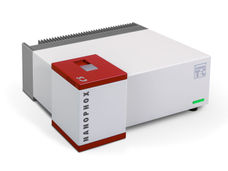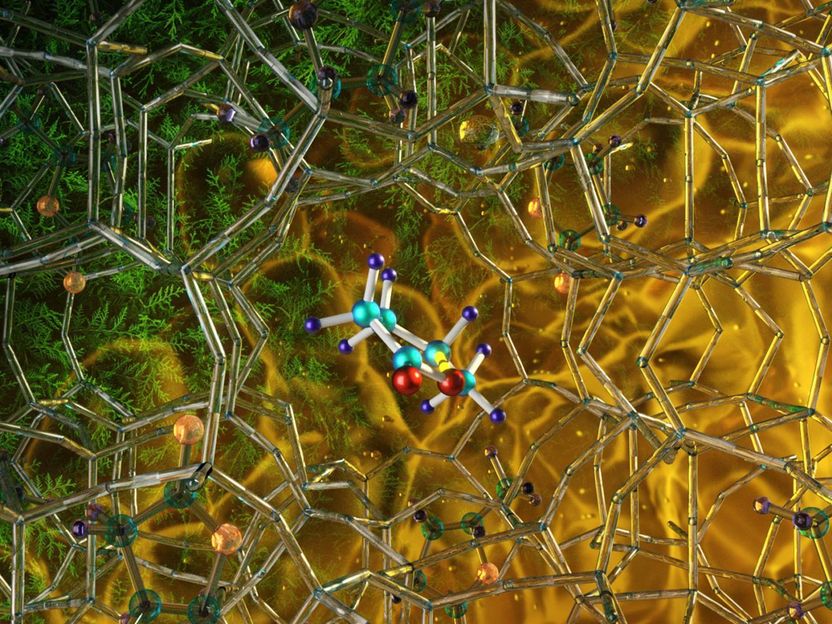Molecules on a string, and why size isn't the only thing that matters for data storage
Physicists get a grip on slippery molecules, and learn how the shape of nanoscopic magnetic islands affect data storage
Molecules of hydrogen are difficult to steer with electric fields because of the symmetrical way that charges are distributed within them. But now researchers at ETH Zurich have found a clever technique to get a grip on the molecules. Their findings are reported in Physical Review Letters and highlighted in the September 14 issue of Physics.
Electric fields can easily manipulate electrically asymmetric molecules like water, but electric forces can't overcome thermal motions for highly symmetric molecules like H2. In the 1980s, researchers in search of a way to manipulate non-polar molecules proposed a trick: excite one of H2's two electrons into a high orbit, disrupting the molecule's symmetry. The far-flung electron feels the pull of the electric field and drags the rest of the molecule along, rendering H2 as manageable as a puppet on a string.
Now Stephen Hogan, Christian Seiler, and Frederic Merkt at ETH Zurich have made this idea reality by overcoming a key problem: an electron in an excited orbit usually reverts to its ground state long before researchers can take advantage of the molecule's maneuverability. They studied several excited orbits in detail, found the longest-lasting ones, and used lasers to select these special states from a group of hydrogen molecules. The newly manageable molecules could be slowed down and trapped for 50 microseconds, plenty of time for the team to study them in detail.
Size isn't the only thing that matters for data storage
Minute magnetic particles, whether bonded to plastic tape or coated onto a hard disk, are the basis of modern data storage. Information is encoded in the magnetic orientation of these nanoparticles, but particles can sometimes switch orientations spontaneously, which can potentially corrupt data. Now researchers from Lawrence Berkeley and Argonne National Laboratories report that this switching unfolds in a more complicated manner than was previously thought. Their work is published in Physical Review Letters and highlighted in the September 14 issue of Physics.
Scientists have long known that spin flipping becomes more likely as the size of a nanoparticle cluster dwindles. But Stefan Krause and his team discovered that this is not the end of the story. Flipping happens as a kind of chain reaction along a cluster, and the shape of a cluster can help or hinder this propagation. Manipulating the shape of a cluster and even inserting impurities can determine whether a switch is more or less likely to be triggered and propagate, potentially adding a new dimension of control to the design of magnetic devices.
Organizations
Other news from the department science
These products might interest you

NANOPHOX CS by Sympatec
Particle size analysis in the nano range: Analyzing high concentrations with ease
Reliable results without time-consuming sample preparation

Eclipse by Wyatt Technology
FFF-MALS system for separation and characterization of macromolecules and nanoparticles
The latest and most innovative FFF system designed for highest usability, robustness and data quality

DynaPro Plate Reader III by Wyatt Technology
Screening of biopharmaceuticals and proteins with high-throughput dynamic light scattering (DLS)
Efficiently characterize your sample quality and stability from lead discovery to quality control

Get the chemical industry in your inbox
By submitting this form you agree that LUMITOS AG will send you the newsletter(s) selected above by email. Your data will not be passed on to third parties. Your data will be stored and processed in accordance with our data protection regulations. LUMITOS may contact you by email for the purpose of advertising or market and opinion surveys. You can revoke your consent at any time without giving reasons to LUMITOS AG, Ernst-Augustin-Str. 2, 12489 Berlin, Germany or by e-mail at revoke@lumitos.com with effect for the future. In addition, each email contains a link to unsubscribe from the corresponding newsletter.
Most read news
More news from our other portals
Last viewed contents
Spectrometer
Unprecedented look at oxide interfaces reveals unexpected structures on atomic scale
Cost-efficient production process and homogeneous luminosity for OLEDs thanks to micro-scale conductor paths




























































